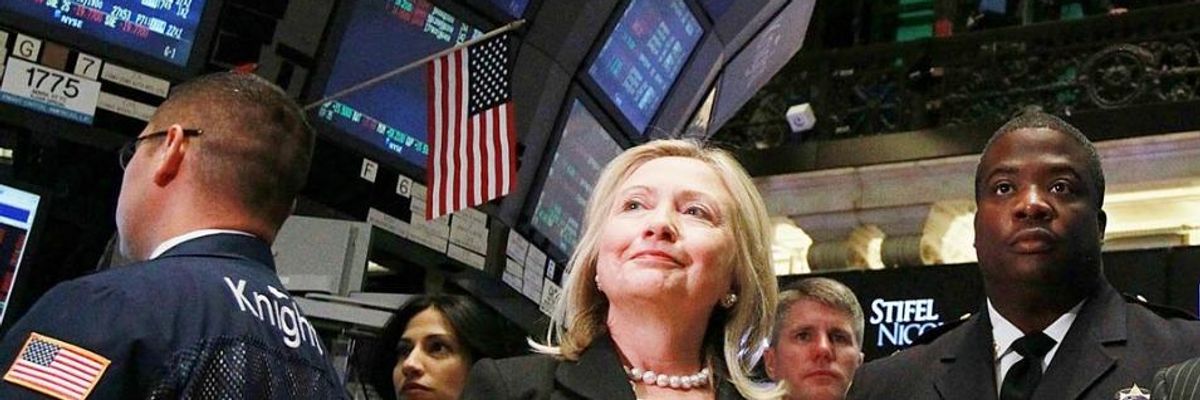With that midterm election out of the way, media are spending even more time talking about the 2016 presidential race. And one of the themes is how Hillary Clinton will create distance from the Obama administration's record.
Along those lines, Politico has a piece (11/11/14) by William Cohan that lays out a strong case that Wall Street (and its money) is more excited about her than Obama. But Politico falls down when it tries to argue that that Obama has been unusually tough on Wall Street.
Under the headline "Why Wall Street Loves Hillary," Cohan lays out a pretty persuasive case that the finance industry has strong feelings for Clinton. The implication is that they don't feel so close to Obama, and there's evidence to bear this one: He took in far less in campaign donations from Goldman Sachs in 2012 than he did in 2008.
The problem with Politico's analysis is how it miscasts Obama's approach to Wall Street:
During a speech last December at the Conrad Hotel, in New York, her message could not have been more different from Obama's hot, anti-Wall Street rhetoric: "We all got into this mess together, and we're all going to have to work together to get out of it."
It's not totally unusual to read about Obama's supposedly tough rhetoric. But what are they really talking about? Cohan tries to spell it out here:
By 2009 the bloom was off the rose. In an interview with 60 Minutes, Obama not only referred to Wall Street as the "fat cat bankers" but also blamed Wall Street for causing the financial crisis. "People on Wall Street still don't get it,"he said. In July 2010, just weeks after a much-vilified Goldman agreed to pay a $550 million fine to the Securities and Exchange Commission-then the largest fine ever-to settle charges stemming from Goldman's underwriting and selling of a synthetic collateralized debt obligation, the details about which the SEC believed Goldman had failed to properly disclose to investors, Obama joked at the White House Correspondents Dinner: "All of the jokes here tonight are brought to you by our friends at Goldman Sachs. So you don't have to worry-they make money whether you laugh or not."
So the evidence is Obama making a comment on 60 Minutes and apparently blaming Wall Street for the economic collapse. But while financiers would no doubt rather be referred to as "entrepreneur/philanthropists" than as "fat cat bankers"-a phrase that did not become a regular part of Obama's vocabulary-there is little doubt that Wall Street does in fact deserve a major share of blame for the financial meltdown. It's peculiar to classify a commonplace observations about the world as "hot rhetoric."
And there's the fact that Obama made a joke about Goldman Sachs' profitability-at a dinner where presidents make jokes!-right after the company just paid out a massive settlement for the kind of behavior that helped fuel the economic collapse.
In other words, this is not exactly a strong case. And the weird thing is, several paragraphs later, the Politico piece admits as much, in its own way:
Where Obama blamed Wall Street--not inaccurately--for behavior that caused the 2008 financial crisis and championed new Wall Street regulations like the Volcker Rule and the 2010 Dodd-Frank law that really stick in the craw of money men--all while presiding over a veritable profit boon for the financial industry--Clinton said hardly a word on the topic of Wall Street shenanigans.
So it's not that Obama was right to say that Wall Street crashed the economy; to Politico, he was "not inaccurate."
The story here, of course, is that Wall Street sees Hillary Clinton more favorably than Obama-something you may have read about it this summer in the New York Times (7/7/14). But Politico shouldn't therefore suggest that Obama has been especially tough on them, rhetorically or otherwise.
UPDATE: The bigger question, of course, is not Obama's rhetoric, but his actions-most notably his administration's failure to hold Wall Street executives responsible for the widespread fraud that helped bring down the economy, and his appointment of financial industry alums like Lawrence Summers and Jack Lew to key economic posts.



